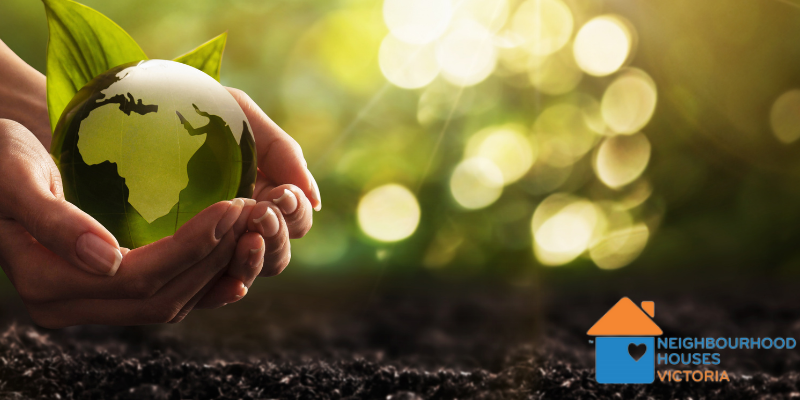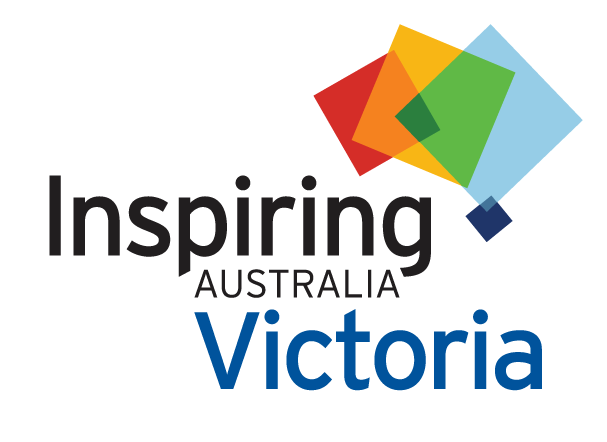Neighbourhood Houses Victoria’s Sustainability Showcase: communities fighting climate change as one

In the face of climate change, the future of the planet depends on our collective actions. The extent to which sea levels will rise, temperatures will warm, and natural ecosystems will change, depend on what we do as a community.
Climate change has been a key priority for Neighbourhood Houses Victoria this year. Supported by Inspiring Victoria grants, 20 Neighbourhood Houses across Victoria are delivering events to encourage communities to come together to showcase local initiatives and build a sustainable future as part of the National Science Week ACCLIMATISE program.
Being sustainable can start right in your own home – in your kitchen and garden. Some neighbourhood houses are inviting members of their communities to learn how to keep themselves and their gardens healthy in a series of workshops. From composting and recycling, to growing vegetables at home and the science of cooking, residents will be empowered to cook from garden-to-kitchen.
 In Aspendale Gardens, Balla Balla, Rosewall and Yarram, pick up sustainability tips and tricks through gardening. Yarram is holding a Community Garden Expo, teaching people to grow winter veggies and cook with their produce. In Balla Balla, community members will also learn to ferment yoghurt, kimchi, kombucha and sauerkraut to keep their gut bacteria happy. Growing your own vegetables and making your own fermented goods not only is environmentally friendly, but is also low cost and encourages a more healthy, diverse diet.
In Aspendale Gardens, Balla Balla, Rosewall and Yarram, pick up sustainability tips and tricks through gardening. Yarram is holding a Community Garden Expo, teaching people to grow winter veggies and cook with their produce. In Balla Balla, community members will also learn to ferment yoghurt, kimchi, kombucha and sauerkraut to keep their gut bacteria happy. Growing your own vegetables and making your own fermented goods not only is environmentally friendly, but is also low cost and encourages a more healthy, diverse diet.
Building on these, Castlemaine Community House is bringing in Permaculture Design experts to guide residents in permaculture principles. These land management practices combine the best of wildlife gardening, edible landscaping, and native plants into one low-maintenance, productive ecosystem in your backyard. As a treat, fresh garden produce will be used by the Murnong Mammas Aboriginal Catering Social Enterprise to cater for the event.
 To promote healthy soils, Yarram and North Melbourne are running sessions on composting and setting up worm farms. Compost and worm wee add nutrients and valuable organisms to your soils. By saving organic waste, not only can you nourish your garden, but you also reduce greenhouse gas emissions. As food waste breaks down in landfill, it emits carbon dioxide and methane – rather than letting them go into the atmosphere, composting returns these carbon products to the earth.
To promote healthy soils, Yarram and North Melbourne are running sessions on composting and setting up worm farms. Compost and worm wee add nutrients and valuable organisms to your soils. By saving organic waste, not only can you nourish your garden, but you also reduce greenhouse gas emissions. As food waste breaks down in landfill, it emits carbon dioxide and methane – rather than letting them go into the atmosphere, composting returns these carbon products to the earth.
Hamilton, Iramoo, Japara, Pakenham and Whittlesea are all exploring the world of decomposers and pollinators. Look at organisms found in soil and compost under the microscope, build bee hotels to encourage native bees to visit your garden or make beeswax wraps. Learn about the role of bees and other insects in the environment. After all, one out of every three or four bites of food you eat is thanks to bee pollination.
 Haddon is taking a look at fungi. View fungi under microscopes and test DNA from fungi to spot the difference between invasive or endangered fungi in your backyard as a citizen scientist. Or perhaps learn about minibeasts in the Bugtopia Tent in South Kingsville, playing with stick insects, butterflies, yabbies and more little critters.
Haddon is taking a look at fungi. View fungi under microscopes and test DNA from fungi to spot the difference between invasive or endangered fungi in your backyard as a citizen scientist. Or perhaps learn about minibeasts in the Bugtopia Tent in South Kingsville, playing with stick insects, butterflies, yabbies and more little critters.
While the previous workshops foster relationships between organisms and our gardens, Wycheproof is defending their region against a particular pest: the fruit fly. Over the past three years, the Queensland Fruit Fly has spread rapidly across the district, destroying crops and home gardens. Learn how to protect your garden from this insidious pest.
 Some communities are banding together to eliminate rubbish that causes serious health and safety concerns for humans, wildlife, and the general environment. Litter, for example, can be breeding grounds for bacteria, or be fatal to animals by ingestion or entanglement. The Aireys Inlet Rubbish Rangers and the Society for the Preservation of Flora and Fauna will come together to encourage the Anglesea community to collect rubbish around town. They will also create an art installation from the litter to serve as an inspirational reminder to take care of the environment.
Some communities are banding together to eliminate rubbish that causes serious health and safety concerns for humans, wildlife, and the general environment. Litter, for example, can be breeding grounds for bacteria, or be fatal to animals by ingestion or entanglement. The Aireys Inlet Rubbish Rangers and the Society for the Preservation of Flora and Fauna will come together to encourage the Anglesea community to collect rubbish around town. They will also create an art installation from the litter to serve as an inspirational reminder to take care of the environment.
Dyes are another devastating environmental pollutant, with tonnes of toxic and carcinogenic chemicals, dyes, and heavy metals constantly being dumped into waterways. These chemicals harm marine ecosystems, disrupt food chains, and pollute essential sources of drinking water. The fashion industry alone is responsible for up to one-fifth of industrial water pollution. Alphington is teaching their community members to sustainably dye wood, cotton and silk using colourful plants and flowers from around the neighbourhood.
Greenhill and Rosewall are running workshops to encourage residents to upcycle – repurposing fabric from old clothing or broken crockery to make something new. Instead of throwing away items, learn how to patch them up. In a workshop with Boomerang Bags at Greenhill, learn to sew and make bags from diverted waste. The Swan Hill/Bendigo Sustainability Group at Kerang will also host a workshop to promote waste reduction by discussing how they can create a circular economy.
Meanwhile, Charlton residents can travel the globe and experience live events using virtual reality – perhaps the more sustainable way to travel given the large carbon footprint of flying around.
Attend any one of these workshops to learn how you can be more sustainable and be part of community action to halt climate change. You might be inspired to start a compost bin or grow your own produce, or to upcycle your waste into a work of art or fashion statement, or start using beeswax for everyday things. How will YOU science this National Science Week?
